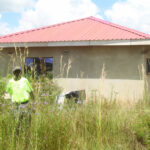A chilling letter, hoisted to the surface on Christmas Eve, reveals the desperate plight of illegal miners trapped deep within the abandoned Stilfontein mine. The letter, penned in a mixture of broken isiZulu and isiXhosa, paints a harrowing picture of starvation, death, and a resort to cannibalism to survive.
The missive, a cry for help from the depths of despair, exposes the grim reality facing these “Zama Zamas,” largely comprised of foreign nationals from Zimbabwe, Mozambique, Lesotho, and a few South Africans.
“Our parents, it’s hard down here. People are dying, they tried to leave through shaft number 10, and they disappeared,” the letter begins, immediately establishing the perilous conditions underground. The desperate plea continues: “We are asking for help our parents, many are also sick.” The miners’ desperation is palpable, their situation dire.
The implication of the final sentence – that hunger is driving them to consume the remains of the deceased – is deeply disturbing.
The letter’s contents, confirming the presence of a significant number of trapped miners, prompted immediate action from the Stilfontein Solidarity Committee and the Mining Affected Communities United in Action (MACUA). They organised and delivered emergency food and water supplies to the desperate miners.
“Thank you to the community volunteers and the comrades on site for the incredible work done in getting the food down to our brothers,” MACUA stated in a public acknowledgement of the relief effort. “We encourage comrades to continue donating so that we can preserve the lives of the trapped miners whom our government has abandoned to die in the dark, below earth.”
This act of community solidarity stands in stark contrast to the recent dismissal of an urgent application by MACUA in the North Gauteng High Court. The organisation had sought a court order compelling the government to provide humanitarian aid, including food, water, and medical supplies, to the trapped miners. The court’s refusal to intervene has been met with widespread criticism, highlighting the apparent failure of the state to protect vulnerable individuals.
The situation in Stilfontein underscores the broader issue of illegal mining in South Africa. Thousands of people risk their lives daily searching for gold in abandoned mines, creating a dangerous and often deadly environment. The economic cost is also significant, with estimates placing the annual loss of gold revenue at over R70 million, impacting both government coffers and the mining sector. The health and safety risks to surrounding communities are equally concerning.
The miners’ plight has been further highlighted by MACUA and Wawua, who have called upon faith-based leaders and organisations to offer spiritual support and solidarity during the festive season. MACUA National Administrator, Sabelo Mnguni, expressed his deep concern:
“Their plight reflects the deep failures of our society—the mines, the state, and the courts failing to uphold basic human dignity and rights. This tragedy echoes the horrors of Marikana, where greed and disregard for life created one of South Africa’s darkest chapters. We vowed ‘never again,’ yet here we are, witnessing the same reckless indifference toward the most vulnerable among us,” he said.
Mnguni emphasised the urgent need for rescue efforts, stating: “While issues of capitalism, inequality, racism, and xenophobia contextualize the Stilfontein tragedy, the immediate priority is rescuing the miners. Every second debating responsibility must not overshadow the urgency of saving lives.”
He strongly criticised the court’s decision to deny state assistance, describing it as a “moral failure, prioritizing bureaucracy over the lives of marginalized individuals.” He concluded with a poignant observation: “As long as the miners remain underground, the festive season is hollow, stripped of the humanity and kindness it represents.” The desperate situation in Stilfontein serves as a stark reminder of the human cost of illegal mining and the urgent need for comprehensive solutions.













